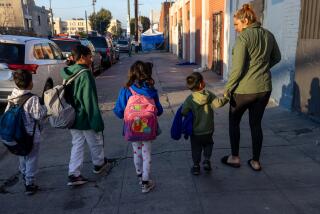City Project Wins Grant for Innovation
A city-operated program geared to reversing the decline of privately owned low-income housing and easing homelessness by encouraging private rehabilitation and construction of single-room occupancy hotels won a $100,000 grant Thursday.
The San Diego Planning Department’s Single Room Occupancy Residential Hotel Program was recognized by the 1988 Innovations in State and Local Government Awards Program as one of the nation’s 10 most creative state or local government projects to address public policy problems.
“Our program was the answer to what the department was going to do about losing so many SRO units to demolition, while the number of low-income single persons who were seeking housing was increasing,” senior planner Judy Lenthall said.
“We are quite proud of winning the award because it proves San Diego is one of the leaders in the country as far as building and maintaining SROs are concerned,” Paul Downey, Mayor Maureen O’Connor’s press secretary, said Thursday. “The image people have of SROs as largely seedy downtown hotels is just not true. (The award) proves the need to find a link for low-cost alternatives to get people into some type of low-cost housing.”
Adopted Over Year Ago
The SRO program was formally adopted by the City Council more than one year ago, and has helped to change existing zoning and building codes and provided financial incentives to encourage the private sector to rehabilitate and construct single-room occupancy hotels for low-income households, Lenthall said.
Since the program’s inception, an estimated 500 rooms have been completed, 700 are under construction and building permit applications for 800 more have been submitted, she added.
Mayor O’Connor and Lenthall received the award Thursday night at a dinner in New York, and will present a brief synopsis of the program at a ceremony in Washington today. The grant will be used to replicate the program in other cities, Downey said.
A program’s applicability in other cities was one of the major criteria for recognition as a governmental innovation, according to Andrea Taylor, of the Ford Foundation, co-sponsor of the competition with the John F. Kennedy School of Government at Harvard University.
More than 970 entries were narrowed to 25 finalists last June.
Among the 25 finalists was the city of Escondido’s program to finance $26 million in sewer and water system improvements. That program was cited for its attempt to be effective without incurring public debt or raising user fees by selling future capacity in the system to raise cash. More than $100 million is expected to be generated by the program over the next 20 years.
Three other Southern California programs were in the final round, including the Long Beach Department of Public Works for its automation of citizens’ service requests; the County of San Bernardino’s Bethlehem House for its comprehensive treatment of domestic violence, and the Ventura County District Attorney’s Parental Child Abduction Recovery Unit, which intervenes when a child is abducted by a parent who is not granted custody in a divorce settlement.
California has had at least one finalist in the competition every year in its three-year history.
Five statewide, three other municipal programs, and one county-sponsored program--ranging from a welfare-to-work program to a housing integration initiative--were among those awarded grants.
More to Read
Sign up for Essential California
The most important California stories and recommendations in your inbox every morning.
You may occasionally receive promotional content from the Los Angeles Times.










